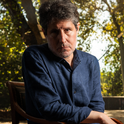On 11th May 1927, Mário de Andrade arrived at the docks of Rio de Janeiro ahead of a much-anticipated boat trip along the Amazon River. For days, he’d been anxious over the whole thing. By his own admission, Andrade did not like travelling, though he did like fellow travellers: he’d only been wrested from his home comforts in São Paulo by the promise of the wealthy arts patron, Olívia Penteado, that this was no ordinary trip. It was to be no less than an intellectual gadabout with Brazil’s most renowned modernist writers and thinkers, among whom Andrade was known as “the Pope”. “I knew we’d have a real wild bunch from São Paulo,” he wrote excitedly in his diary; “a real circus troupe, all great fun and up for anything.”
Andrade was late to the docks, meaning it was only after the mad dash to board that he could take stock of the illustrious literary company he’d be travelling with for the next three months. Before him there stood: the patron, Dona Olívia; her 21-year-old niece, Dolur; and her niece’s friend, Mags. Andrade was the only writer who had bothered to show up.
“Everyone had flown the coop!” he lamented.
All the same, the trip might yet serve another purpose.
Modernism had arrived in Brazil at a particularly interesting juncture in the country’s history. In the year before Andrade’s birth in 1893, its emperor had been dethroned—the last monarch standing in Latin America and Brazil’s last living link to its colonial heritage. (Pedro II was a direct descendent of the Portuguese House of Braganza.) In the decades that followed, newly paved roads had begun slicing through the terra roxa of the rainforest; the vast avenues of São Paulo were filling up with new-fangled automobiles; electric streetlights illuminated the bustling pavements. The march of modernity, it seemed, was in lockstep with the founding of a truly postcolonial Brazil, a land of the future, a country of progress.
Yet if the constitution was no longer constricted by European norms, traces of those norms were still apparent in Brazil’s understanding of its national identity. Inevitably, that was going to cause friction. For if it appeared that culture led back always and inexorably to the mind of Europe—as TS Eliot might say—what did this tell us about a country that had only recently begun to move away from its European trappings? What did it say about all this so-called progress?
For Andrade, as for many Brazilian modernists of that time, European cultural hegemony had come at a price. By sidestepping the cultural lineages it owed to elsewhere, Brazil had, he wrote:
let itself remain that which by virtue of climate, race, cooking, everything, it will never be able to be, will only ever be able to ape: Europe. We take pride in being the only great (great?) civilized country in the tropics. This is the flaw in us… We ought to think and feel like Indians, Chinese, folks from Benin, Java… Perhaps then we might be able to create a civilization of our own.
The subtext was that it would fall to the Amazon and in particular its indigenous communities—many of whom remained elusive and obscure to the civilised (read: European) world—to play a big part in the project to rewrite Brazil’s national story. (“Tupi or not Tupi, that is the question,” as the modernist rallying-call “The Cannibalist Manifesto” from 1928 put it, sarcastically, in English.)
By 1927, Andrade was well established as a poet and modernist mover and shaker, having helped organise São Paulo’s influential Semana de Arte Moderna in 1922. His passion and profession in music had led to stints in the Brazilian interior and along the coast, mostly to catalogue folk songs, but never into the tropics; in any case, much of his understanding of Brazil’s indigenous people still came largely from books produced by German ethnographers. Biracial and (closeted) queer but living a bohemian, vaguely bourgeois lifestyle, Andrade was painfully aware that inside him there persisted a “neat grey European” who bristled at the “not-enoughness” of his homeland. And so, what better way to shake loose this neat European than to get his head out of books for a while and get down there among the reeds, where the foundations of his newly concocted civilisation could be found?
Yet judging by The Apprentice Tourist—a compilation of Andrade’s journal entries from his fated trip with Dona Olívia, recently published in a new English translation by Flora Thomson DeVeaux—the Brazilian tropics were much less forthcoming than had been presupposed. Andrade’s interactions with indigenous communities were limited, with those that did occur happening mostly from a boat’s distance. In their place came lonely days interrupted by prearranged “gubernatorial lunches”, where fawning provincial mayors bored Andrade stiff in their attempts to flatter Dona Olívia into offering her patronage. And this was to say nothing of the weather—which was too hot or too chilly—or the nature—which was monotonous and difficult to put into words—or Andrade’s fellow passengers—who were either ignorant, tedious or just irritatingly there all the time: “Too many children, I even dreamed about the little lambs having their throats cut,” he writes breezily one day. And let’s not get started on the fact that the only film every cinema in every town seemed to be screening was the dreadful Do It Now by William Fairbanks! (It was only later that Andrade discovered it was his own ship that was distributing the film.)
Farce from start to finish the trip may have been, but actually that was a blessing in disguise—for Andrade was a writer who was at his most inspired when trying to relieve himself of his boredom. Early on, he realised that if he wasn’t able to make any meaningful contact with indigenous people, then why didn’t he just… make it up? Peppered between his humdrum journal entries—and in the overly pompous tone of, say, a German ethnographer—Andrade digresses from his “life onboard” to relay details, with wide-eyed credulity, of his extraordinary encounters with indigenous communities, some partially real and others completely falsified, yet always well and truly beyond belief. Encounters with people such as the Do-Mi-So Indians, a tribe said to speak in musical tones rather than words, who consider the face and head more sexual than the genitals and who believe they are descended from sloths; and the Pacaás Novos—the name of a real community—who supposedly consider the nose and ears to be the most shameful parts of the body and for whom “speaking is the most sexual act” and who are “strict about the notion of virginity” as it relates to the ears (whatever the hell that means).
These as well as other outlandish events—such as the discovery of a government-issued tap attached to a tree that dispensed honey, or how he spent several days lost in the jungle with “Klein the German” and “Musset the Frenchman” surviving on nothing but skinned geckos—Andrade recounts with the straightest of faces and often with little suggestion that they are any more removed from reality than his gubernatorial lunches. “I often hesitate to recount certain things for fear I won’t be believed,” he quietly moans, with a wink.
While these fantasising asides might read as though they were written to pass the time and shoot the shit, at their root was a more serious intent. Andrade was perhaps not even aware of this himself until the return leg of his journey, when, while browsing a market in Belém selling indigenous tourist tat—“quite ugly, worthless, used”—he came to something of a casual epiphany. “It has yet to occur to anyone that falsification is the way to make these things worth more… The false document is what makes the true one legitimate. And value never really lies in truth per se, but in legitimacy, don’t you think?”
In other words, if reality was not quite fit for purpose, then the answer was to bend reality to fit your purposes—just as Andrade had been doing all along. At the very least, it was in the process of mythmaking that the country of Andrade’s imagination became more vivid, more alive—“It’s extraordinary how everything bubbles up with beings, with gods, with indescribable beings behind it all”—and more easily transcribed than anything he could have seen with his own two eyes.
If reality was not quite fit for purpose, then the answer was to bend reality to fit your purposes—just as Andrade had beendoing all along
The December before Andrade set off on his Amazonian trip, he had completed the first draft of a novel in a manic six days at his uncle’s farm to the northeast of São Paulo. In the following decades, that novel, Macunaíma: The Hero with No Character, would be regarded as a touchstone of Brazilian modernism. Apart from the retitling of some chapters, it seems the novel appeared in 1928 largely unscathed from Andrade’s time in the Amazon. You could say it took a trip into the unknown to affirm the things that he already knew.
“In the depths of the virgin-forest was born Macunaíma, hero of our people.” Thus the story begins—in this new translation by Katrina Dodson—setting the tone for a wild ride of adventure blending grand origin story with folksy urban legend. The plot, as far as it goes, follows the life of the titular Macunaíma—an “ugly child” born of a native Tapahumas woman—as he sets off with his two brothers, Maanape and Jiguê, to retrieve the coveted Muiraquitã amulet, stolen by the cannibalistic Piaimã the Giant (also called Venceslau Pietro Pietra).
Since it is broken up into episodes in the manner of an epic fable, you could, in theory, read the story in more or less any order without much loss of coherence. In his dogged pursuit of the amulet, Macunaíma partakes in strange rituals and meets an overwhelming array of “local” characters, historical, contemporary and mythological. He darts across great swathes of Brazil by train, plane and talking stork in a matter of minutes. He possesses shapeshifting powers (at one point turning Jiguê into a telephone in order to “insult Venceslau Pietro Pietra’s mother”) and superhuman strength, yet also mortal vulnerability, able to survive daring feats while still dying ingloriously from an arrow to the heart (before he is swiftly resurrected just a few pages later). He outwits his opponents with guile and street smarts, while also being outwitted in turn. In one notable incident, Macunaíma is convinced to give away all his money to a pedlar offering a magical possum that, it is claimed, can defecate gold coins. When he gleefully stretches out his pocket in anticipation of the first time the possum needs to go, you know exactly what’s going to happen.
All of this, told in urbane vernacular but with a vast vocabulary of indigenous words that would have been foreign even to metropolitan Brazil, results in a reading experience that is wholly disorientating. It is also—perhaps rare for a modernist work—a lot of fun. Unlike many of his contemporaries in Europe, Andrade refuses to speak in the cadence expected of a leader of the faithful; his language is energetic, witty and without a hint of pretension. “Get a load of this,” he seems to say on every page, nudging and (still) winking all the while.
There was much more behind this facetiousness than literary chicanery, however, as evinced by Dodson’s extensive endnotes to her translation. Each event and character in Macunaíma is derivative of something else, from myths and stories drawn from Pemon, Tupi, west African Yoruba and Brazilian folklore, to the names of flora and fauna from botanical books. “I hardly had to invent a thing in this poem that came so easily,” as Andrade boasted. And through this intermingling of multiple heritages came something a little like Brazil itself.
Yet despite this diligent completion of the brief—to create a narrative that was an admixture of so many parts yet still resolutely Brazilian—it’s clear from Andrade’s drafted prefaces and letters to friends before the publication of Macunaíma that he remained unsure whether he had created a “Brazilian” story, or whether that was even desirable. In a drafted note from 1926, he writes about achieving “the merit of literarily conceiving Brazil as a homogenous entity”, while adding a sentence later: “This is also to say I am not convinced that I have made a Brazilian work.” In his preface from 1928, one paragraph begins: “The best elements of a national culture appear in it.” Then, in the following paragraph, he begins: “Now I don’t want you all to imagine that I set out to make this book an expression of Brazilian national culture.”
Part of this ambiguity might stem from Andrade’s persistent cultural cringe. Despite mocking their pomposity in The Apprentice Tourist, Andrade readily admits that he drew much of his knowledge of indigenous myth for Macunaíma from those self-same, omnipresent German ethnographers. Chief among them was Theodor Koch-Grünberg, who in the 1910s had transcribed the legends of Pemon-language storytellers in the region straddling Brazil, Venezuela and Guyana; it was in a book of Koch-Grünberg’s transcriptions that Andrade first encountered (and lifted) the trickster character “Makunaimã”. In this light, it seems unavoidable that Andrade’s use of indigenous legend is still loaded with European assumptions about how such legends should be formulated and understood. Rather than standing on its own two feet, Brazil remains—in Macunaíma—beholden to the European example.
And aside from what nowadays some might call his cultural appropriation—or what many Brazilian modernists described favourably, though troublingly, as an act of “cannibalism”—we might also find Andrade’s characterisation of Brazilians as having “no character” equally problematic.
Like many heroes in myth, Makunaimã appeared as a protagonist free from the complexities of personality and development; he was there to fulfil whatever function a given storyteller required. For Andrade, this was a perfect analogy for Brazil as a whole. “The Brazilian has no character because he possesses neither his own civilization nor a traditional consciousness,” he wrote gloomily in the first preface from 1926; “it is from this lack of psychological character that we derive our lack of moral character.” We only need to look at the environmental devastation of the Amazon to know how this blank-slate mentality—of a land that is empty of culture, nothing but a wild frontier waiting to be conquered or controlled—plagues Brazil to this day.
But it would be wrong to consider any of this a mere failing on Andrade’s part, or Macunaíma as a lesser work for being unable to fully answer the contradictions it set out to confront. As with any difficult subject, the hardest part is often just to broach it. Andrade knew that the best way to begin a conversation was with a smile and a joke. Reading him almost a century later, his message is as simple and efficient as any good punchline: keep talking.















